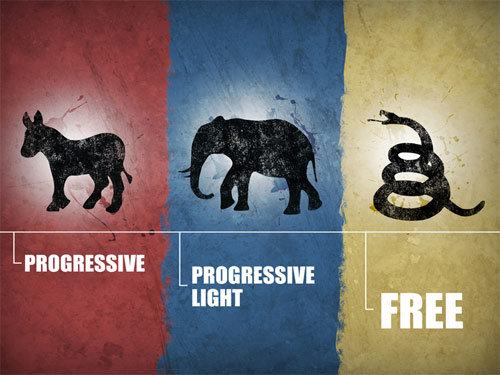I think, in order to open this blog with my “Hello World” post, I’ll re-post one of the more popular posts from the old Skalduggery. There is a reason for this other than laziness – it establishes, in a small way, some of the values I cherish.
Christopher Hitchens, in the first article of a series of three, rages against and castigates the very likes of God and religion. These articles are excerpts from his new book, God Is Not Great: How Religion Poisons Everything. I can’t help it, I like the guy. He’s an obnoxious iconoclast – but he THINKS. Can’t say that I agree with him on any of a number of things, but there are several elements of this first installment that I do agree with. However, like one of the respondents, not only is there plenty to disagree with, there is much about religion that has produced some of the best in humanity. “When atheism becomes as intolerant as fanatical religion,” perhaps it’s time to take a step back and watch what spews out of one’s mouth. I believe the respondent had the right of it:
…just because religion is conducive to intolerance and bloodlust, Hitchens the belligerent warmonger proves that atheism is no guarantee of benevolence. Certainly Stalin and Mao found other ideologies to justify their appetite for destruction.
Trotskyite that he is, I’m certain Hitchens will excuse atheism and blame the evil Stalin and his perversion of an ideology… mmm, what’s that? Hitchens Is Not Great: How People Poison Ideologies.
Blech.
Why the commentary on Mr. Hitchens? Because he attempts to marginalize another, much more humble person I admire. C.S. Lewis wrote The Abolition of Man to address a subject that my friend over at The Coffeespy and a friend at work have knocked around. To use Lewis’s phrase, we in the West are raising “Men Without Chests.” This discussion might seem a little convoluted, but please, bear with me here – it will come right in the end.
Lewis performs a critical analysis of a school text book as launching off point for a defense of objective values, what he in shorthand, calls the Tao. Throughout the book he uses principles from the Tao, but as he makes clear, this is a word he is using to represent more than the Chinese concept:
The Chinese also speak of a great thing (the greatest thing) called the Tao. It is the reality beyond all predicates, the abyss that was before the Creator Himself. It is Nature, it is the Way, the Road. It is the Way in which the universe goes on, the Way in which things everlastingly emerge, stilly and tranquilly, into space and time. It is also the Way which every man should tread in imitation of that cosmic and super cosmic progression, conforming all activities to that great exemplar.17 ‘In ritual’, say the Analects, ‘it is harmony with Nature that is prized.’18 The ancient Jews likewise praise the Law as being ‘true’.19
This conception in all its forms, Platonic, Aristotelian, Stoic, Christian, and Oriental alike, I shall henceforth refer to for brevity simply as ‘the Tao’ (Columbia’s put the book online).
Where Lewis uses a text book on literature to demonstrate that modern man is losing the understanding that there is a real objective value system, I would quote a single passage from the actual Tao. However, before I do, one of his examples is straightforward; the notion that a particular vista is sublime. The literature textbook tries to inculcate in the student that this simply means one has sublime feelings about the scene in question. Lewis, rightly, identifies that as an absurdity. If a person were describing his feelings, then certainly the sentence might start “That makes me feel…”
“That vista makes me feel sublime.” First, sublime means “so awe-inspiringly beautiful as to seem almost heavenly” (Encarta). It’s an adjective not a feeling. Lewis rightly points out that the emotions one experiences are virtually opposite of the descriptor itself. If one says an ocean view is sublime, it is not because one feels awe-inspiringly beautiful – the emotional correlative is veneration or humility. The scene inspires AWE. More than that, one is saying that the scene is worthy of veneration. Through a long, but entertaining and educational argument, Lewis connects this codswollop to the death of courage as virtue, in fact, to the death of the civic and cardinal virtues.
Now then, the easy way is the way, in the Tao:
When the Tao is lost, there is goodness.
When goodness is lost, there is morality.
When morality is lost, there is ritual.
Ritual is the husk of true faith,
The beginning of chaos (Tao te Ching, #38).
Our culture progresses into idiocy for lack of that central organ in man, the chest, which is atrophied by the very cowards who cut their own hearts out. Lewis reminds us that “the head rules the belly through the chest.” The head representing our reason, the belly our appetites, and the chest – “The Chest-Magnanimity-Sentiment—these are the indispensable liaison officers between cerebral man and visceral man. It may even be said that it is by this middle element that man is man: for by his intellect he is mere spirit and by his appetite mere animal” (Lewis, 1943).
I love poetry, especially poetry that inspires awe, celebrates courage, fidelity, loyalty, and so many other virtues associated with the chivalric code. Most recognize Tennyson’s noble 600 in the Charge of the Light Brigade, and sometimes people recognize at least a part of Ulysses. Each celebrates various virtues. Lewis finds the fact that these authors of the literature textbook are called intellectuals intolerable:
The operation of The Green Book [the literature textbook] and its kind is to produce what may be called Men without Chests. It is an outrage that they should be commonly spoken of as Intellectuals. This gives them the chance to say that he who attacks them attacks Intelligence. It is not so. They are not distinguished from other men by any unusual skill in finding truth nor any virginal ardour to pursue her. Indeed it would be strange if they were: a persevering devotion to truth, a nice sense of intellectual honour, cannot be long maintained without the aid of a sentiment which Gaius and Titius [the authors] could debunk as easily as any other. It is not excess of thought but defect of fertile and generous emotion that marks them out. Their heads are no bigger than the ordinary: it is the atrophy of the chest beneath that makes them seem so.
And all the time—such is the tragi-comedy of our situation—we continue to clamour for those very qualities we are rendering impossible. You can hardly open a periodical without coming across the statement that what our civilization needs is more ‘drive’, or dynamism, or self-sacrifice, or ‘creativity’. In a sort of ghastly simplicity we remove the organ and demand the function. We make men without chests and expect of them virtue and enterprise. We laugh at honour and are shocked to find traitors in our midst. We castrate and bid the geldings be fruitful (Lewis, 1943).
I’ve spent too much time harping on a pet peeve. I’ve been reading books on the CIA, John and Robert Kennedy of late, and I think they were perhaps the last of the liberal Democrats I admired. RFK seemed to recognize the decay CS Lewis identified and set on our dinner tables. RFK’s “philosophy, which he urged on others and truly tried to live by himself, was: we may be doomed, but each man must define himself anew each day by his own actions” (Thomas, 2000, p. 22). I think we’d find far fewer traitors in our midst should we define ourselves anew each day by our actions. I’m a retired sailor, so I’ll sign off with a final note from Ulysses:
Push off, and sitting well in order smite
The sounding furrows; for my purpose holds
To sail beyond the sunset, and the baths
Of all the western stars, until I die.
Alfred, Lord Tennyson
Like this:
Like Loading...



